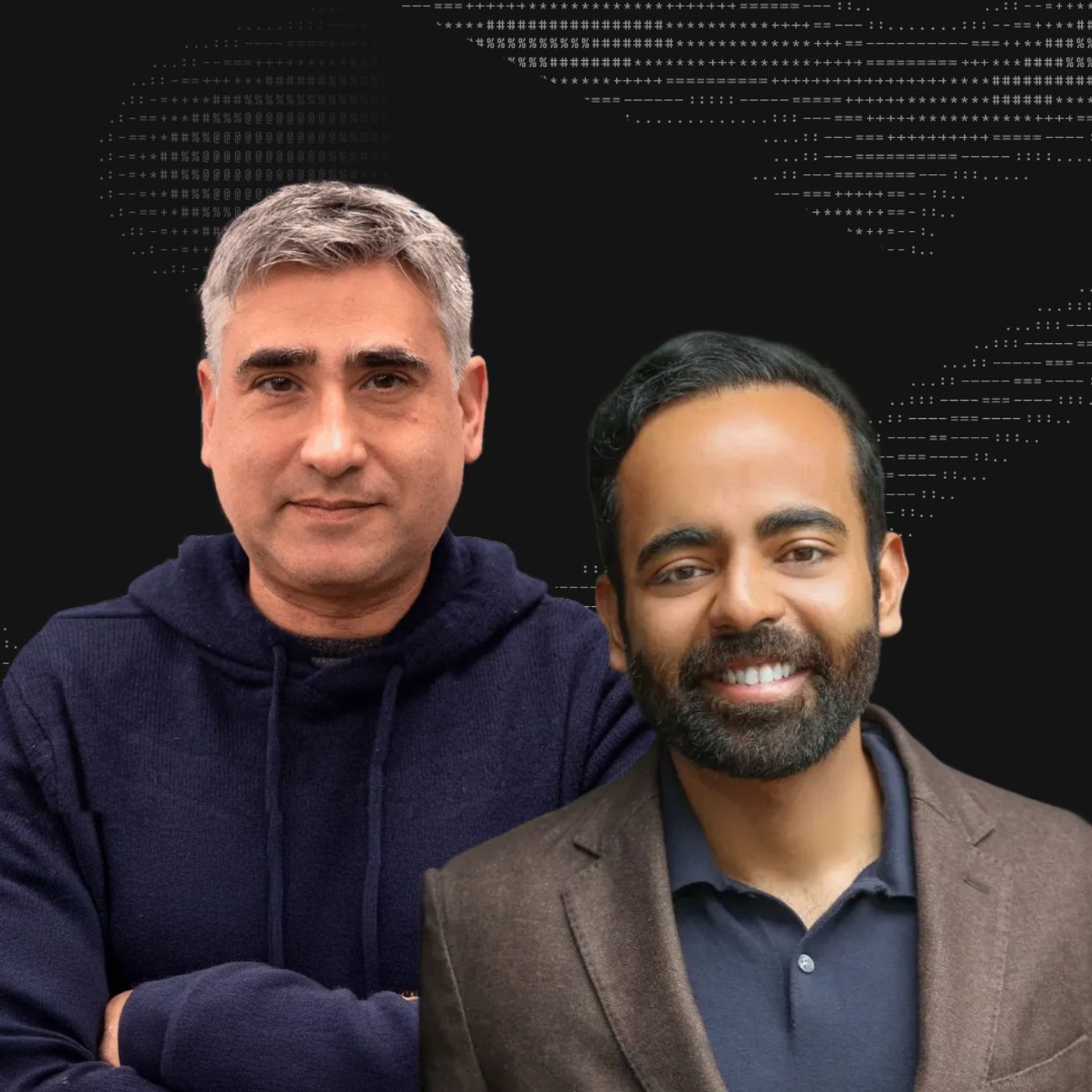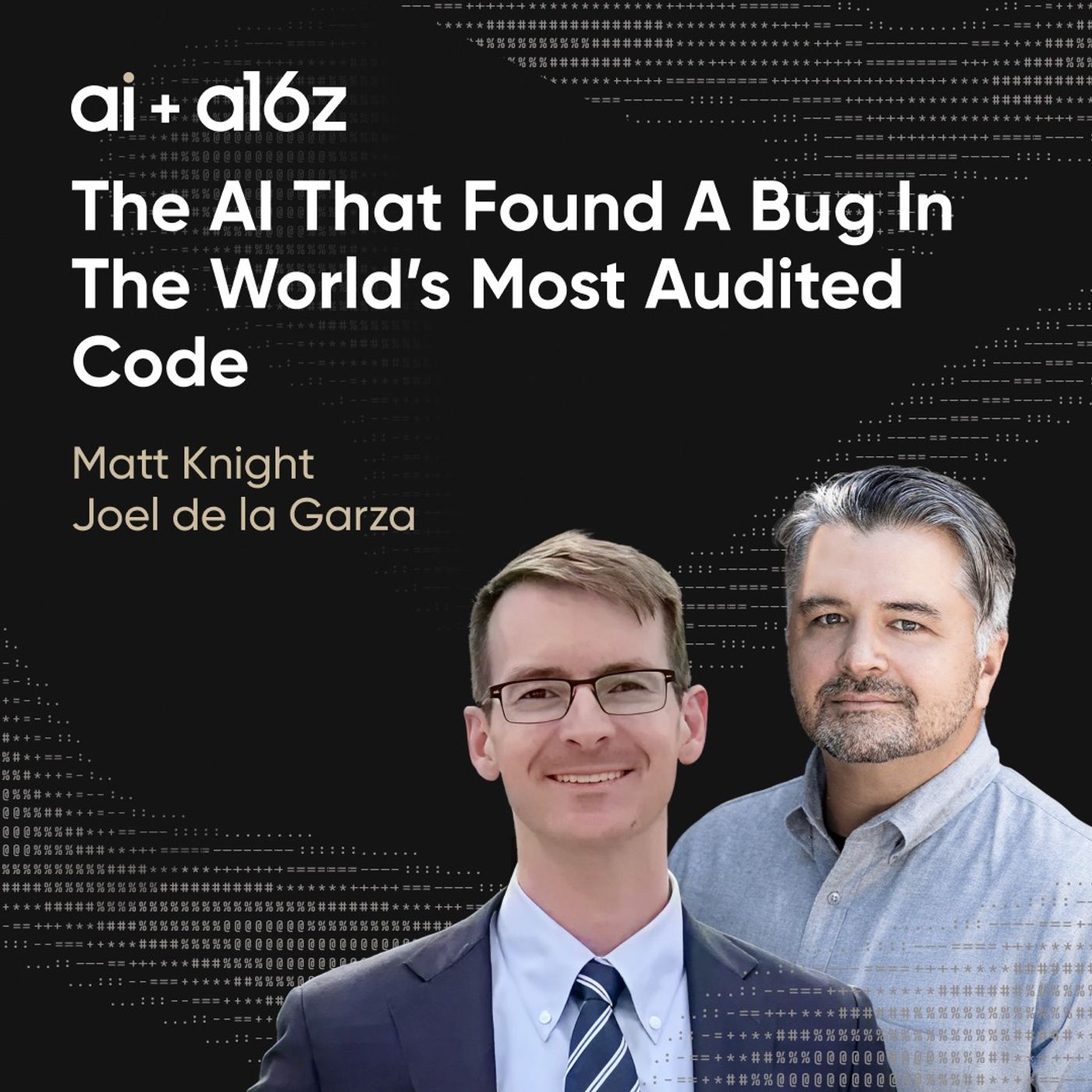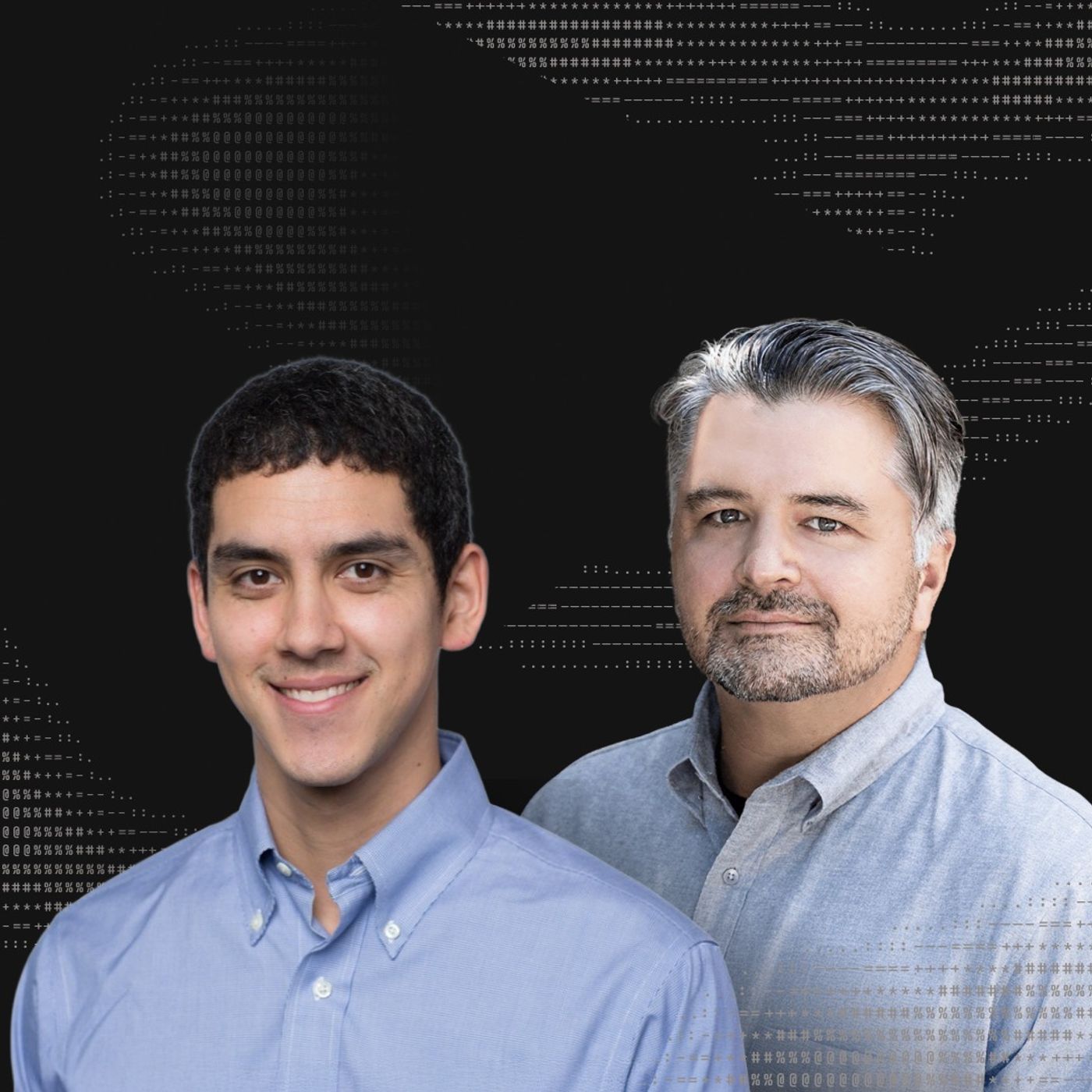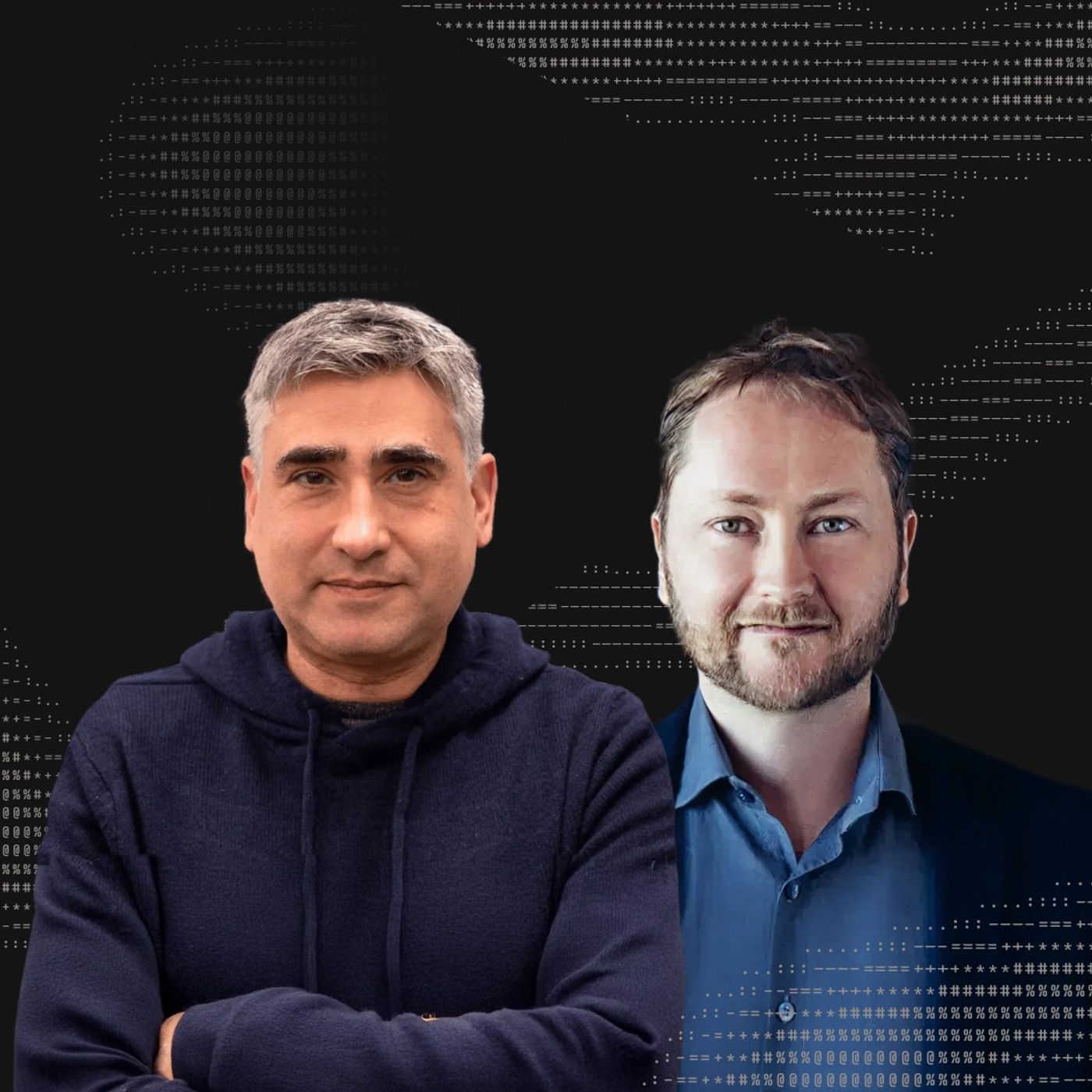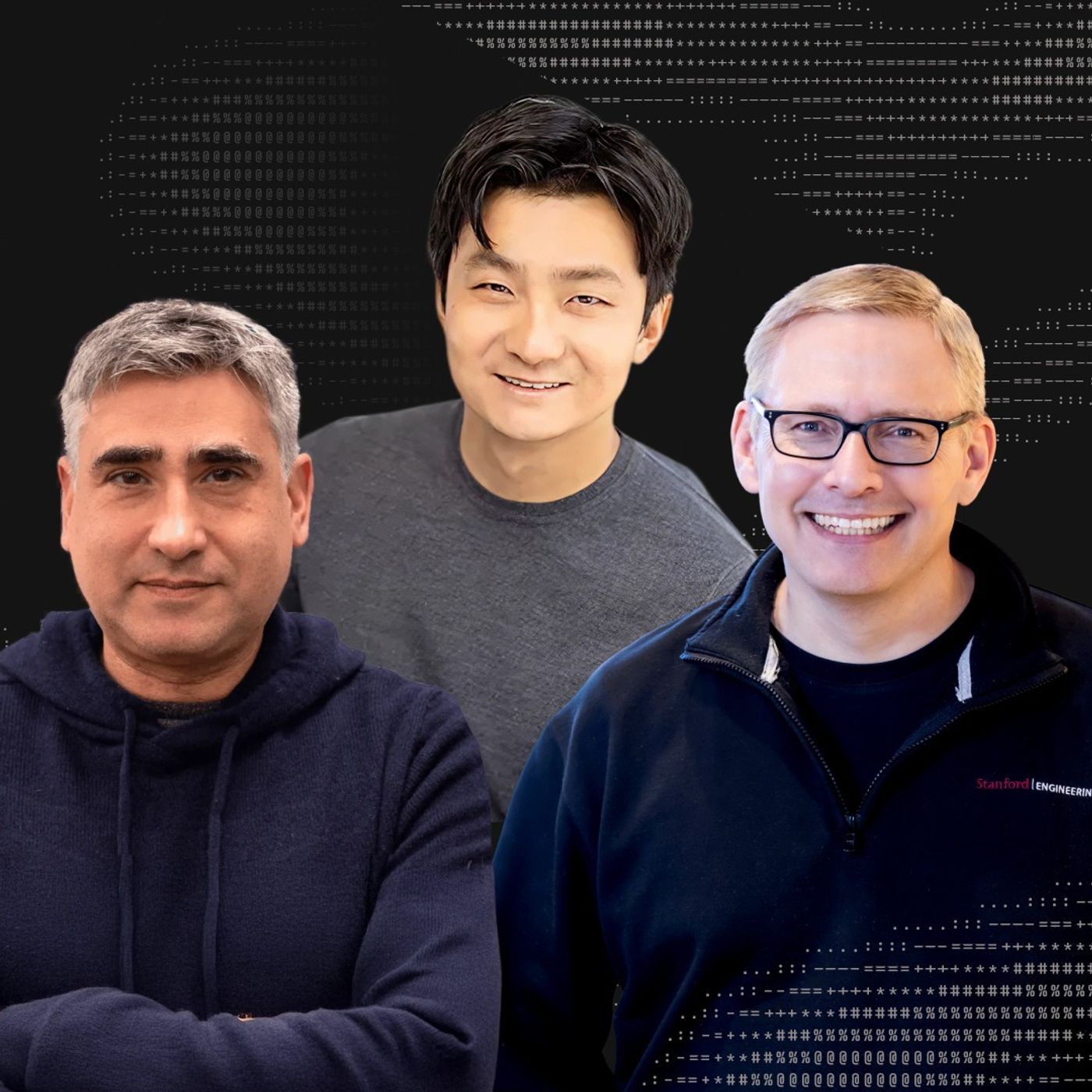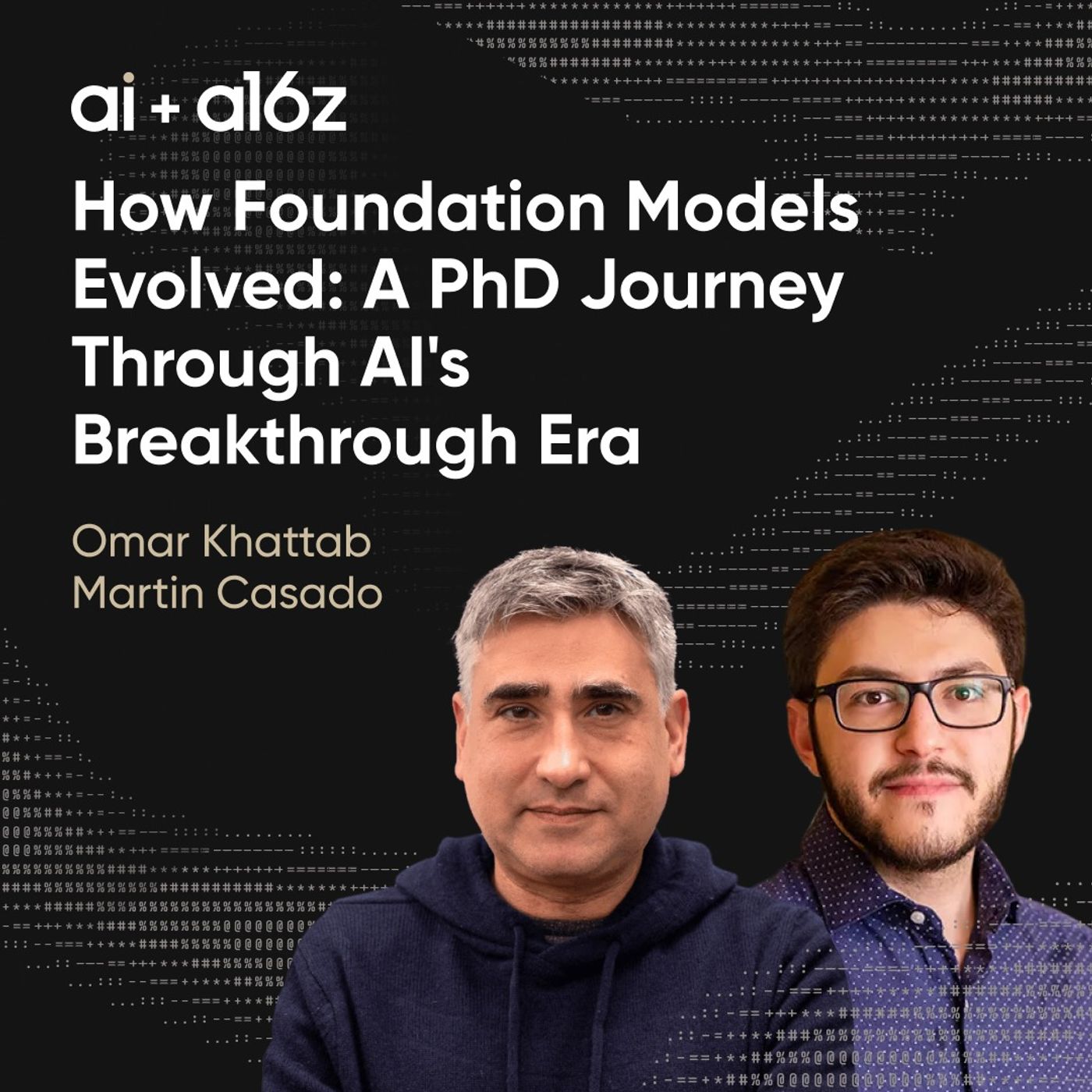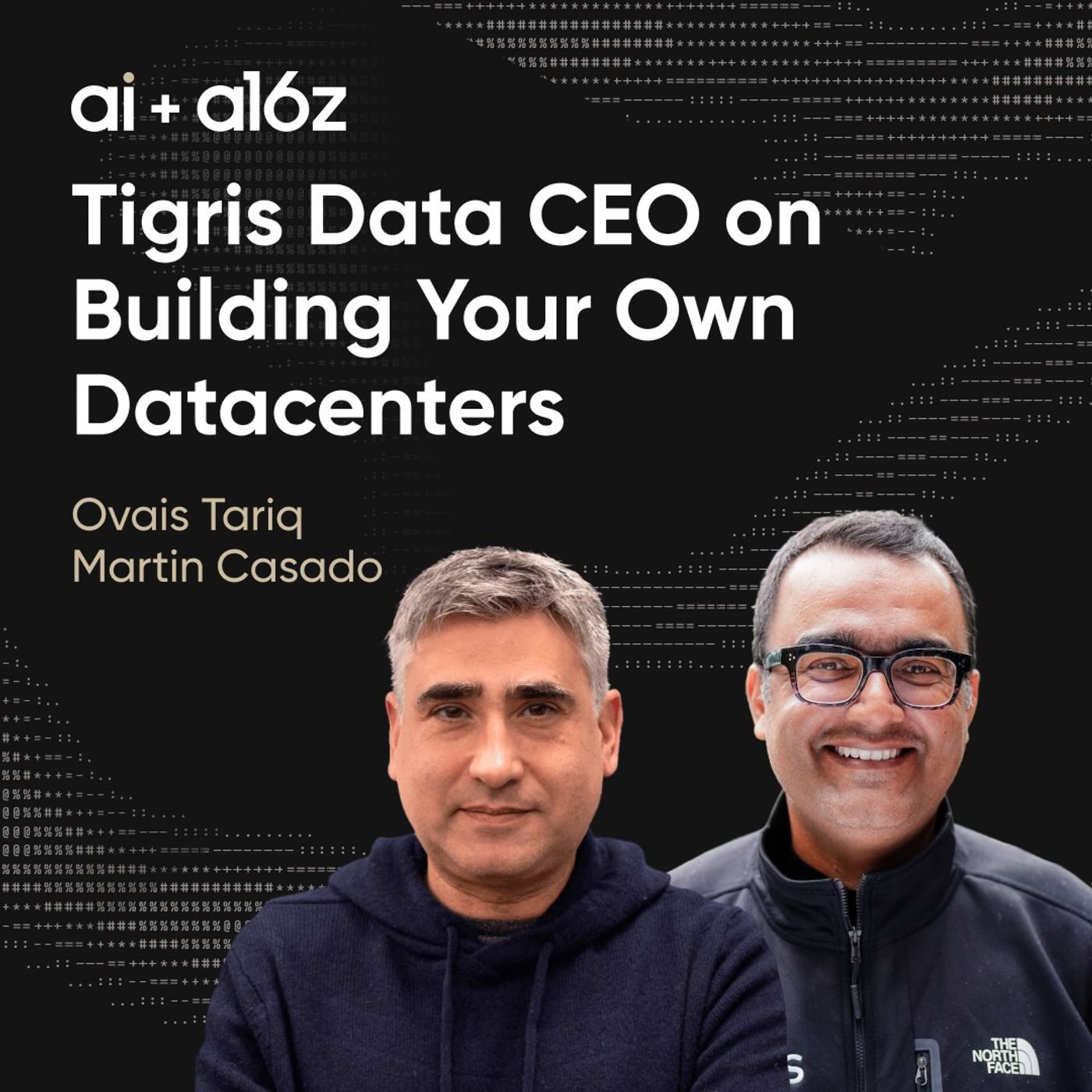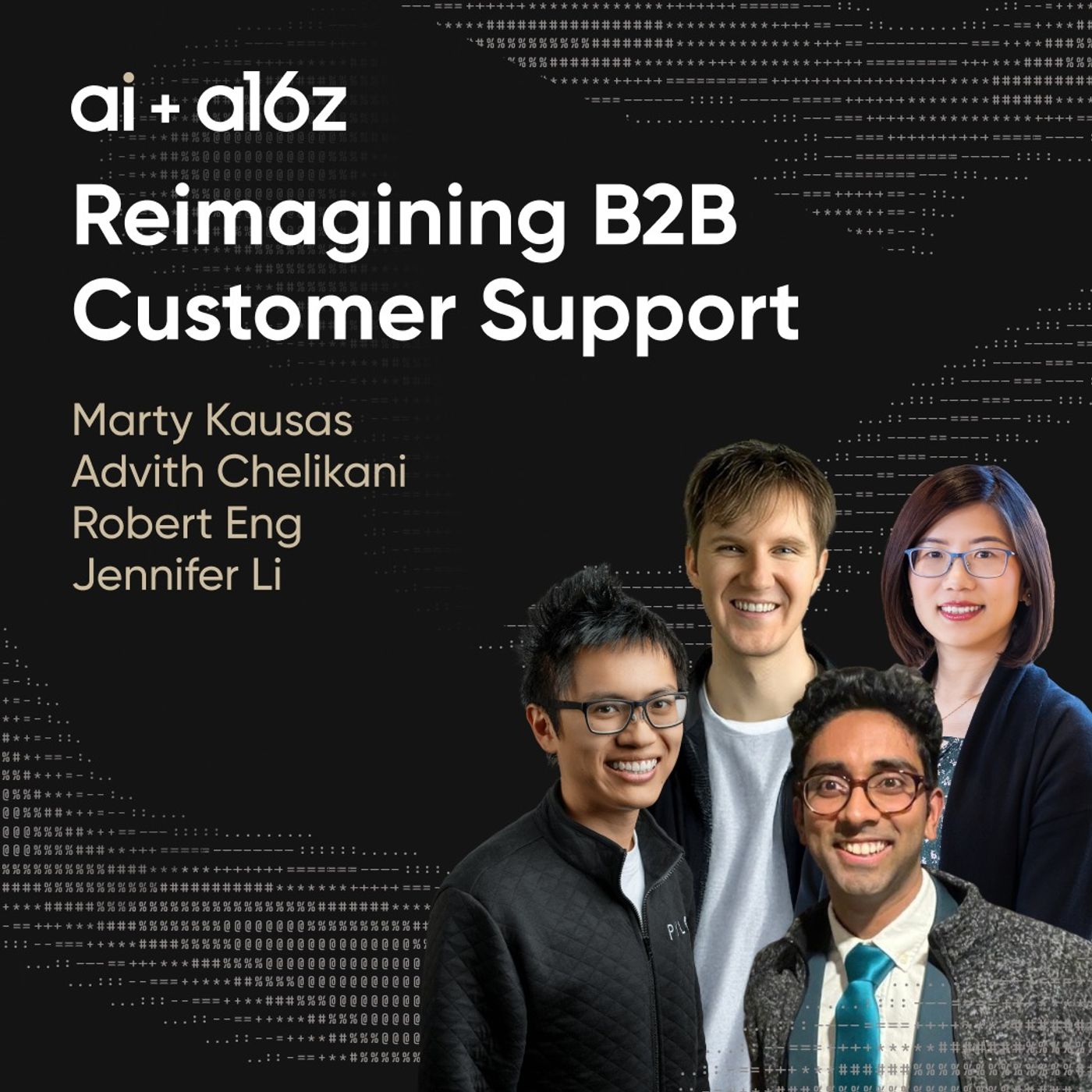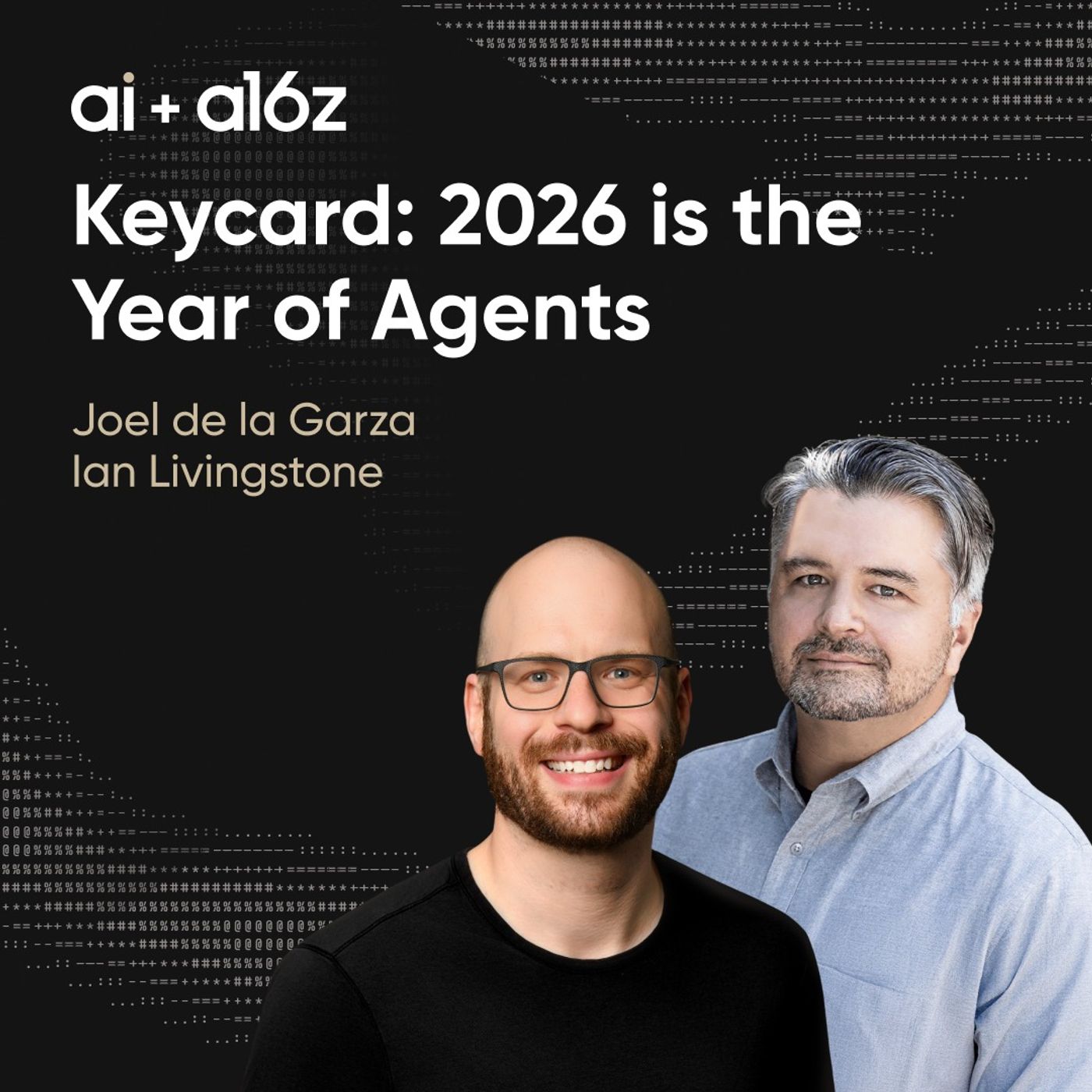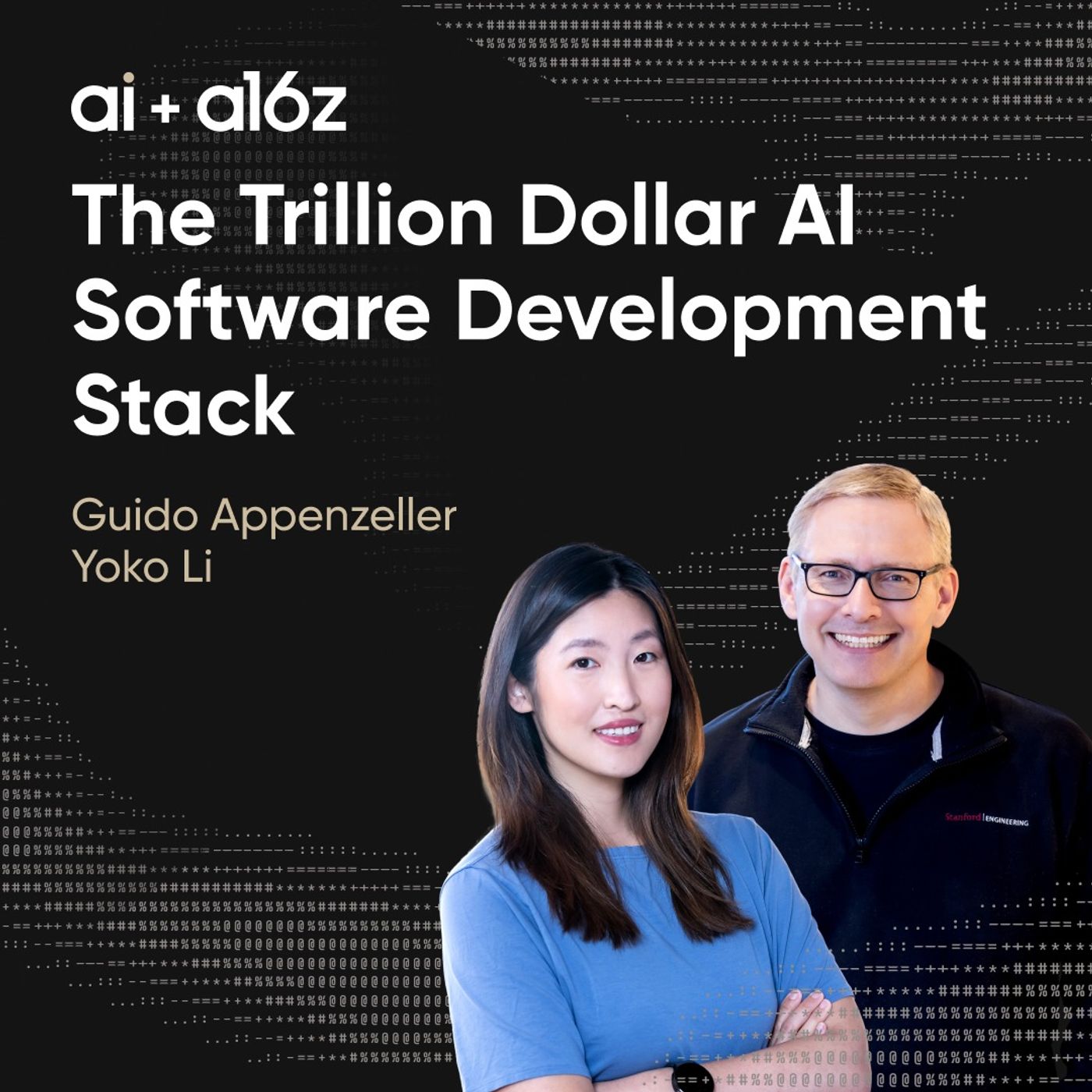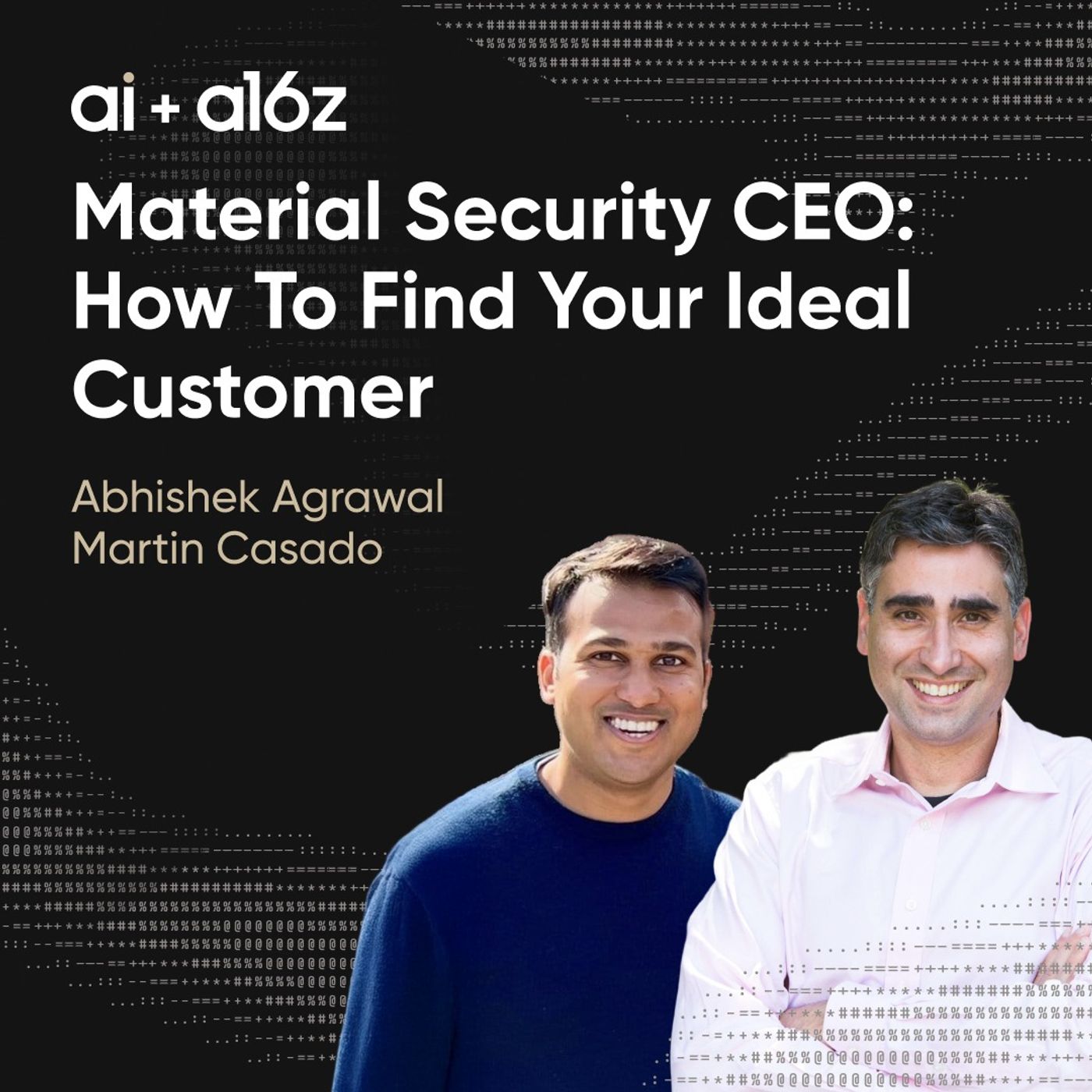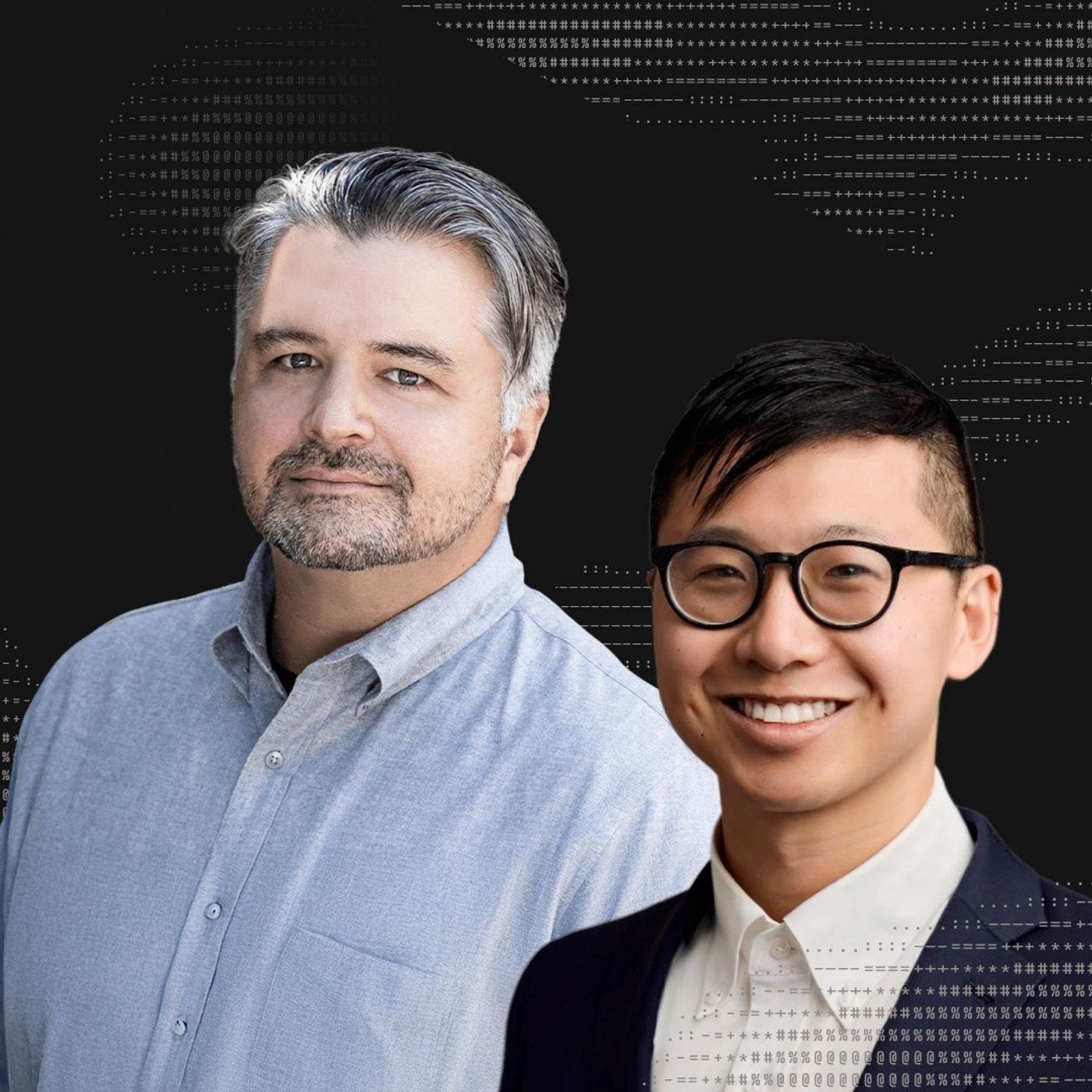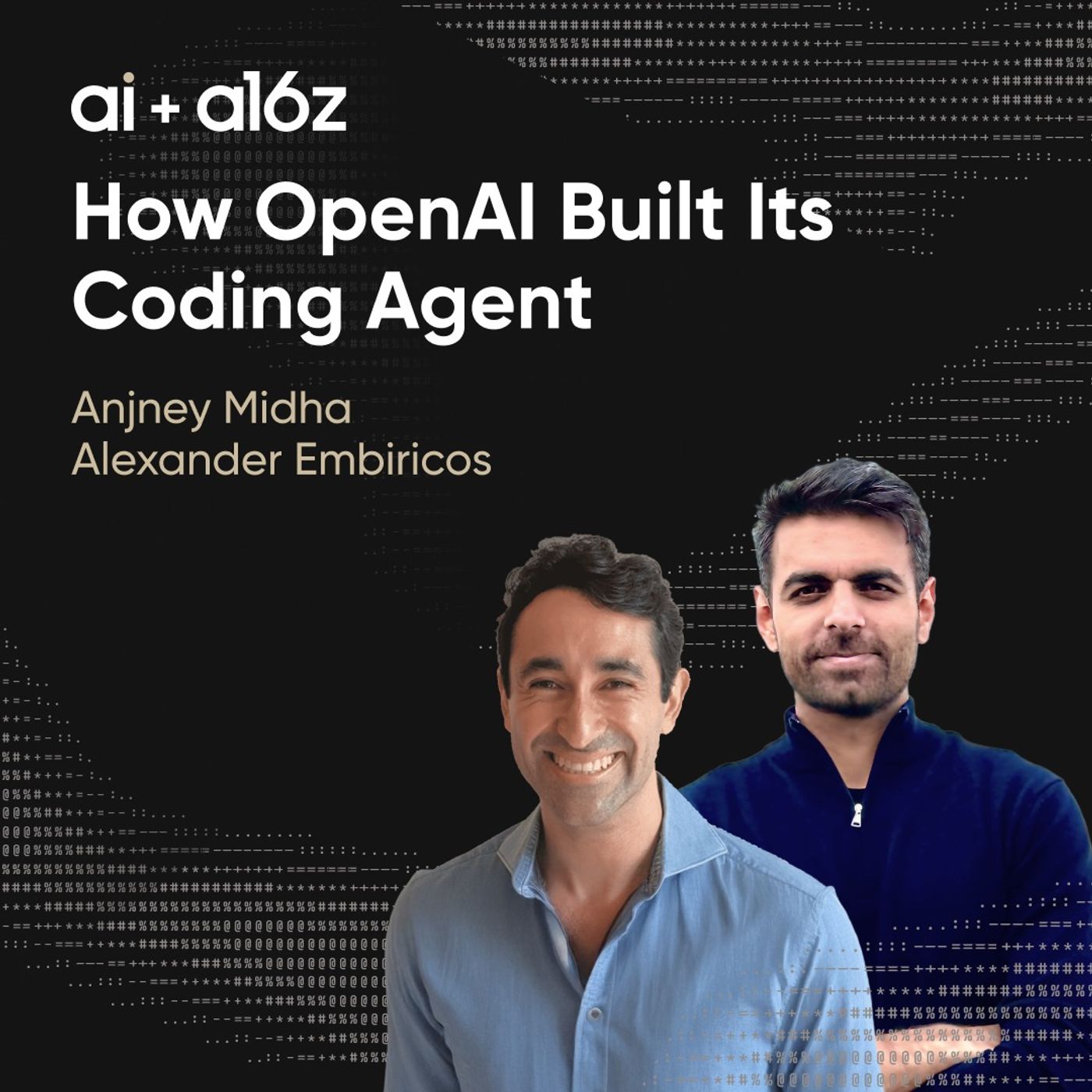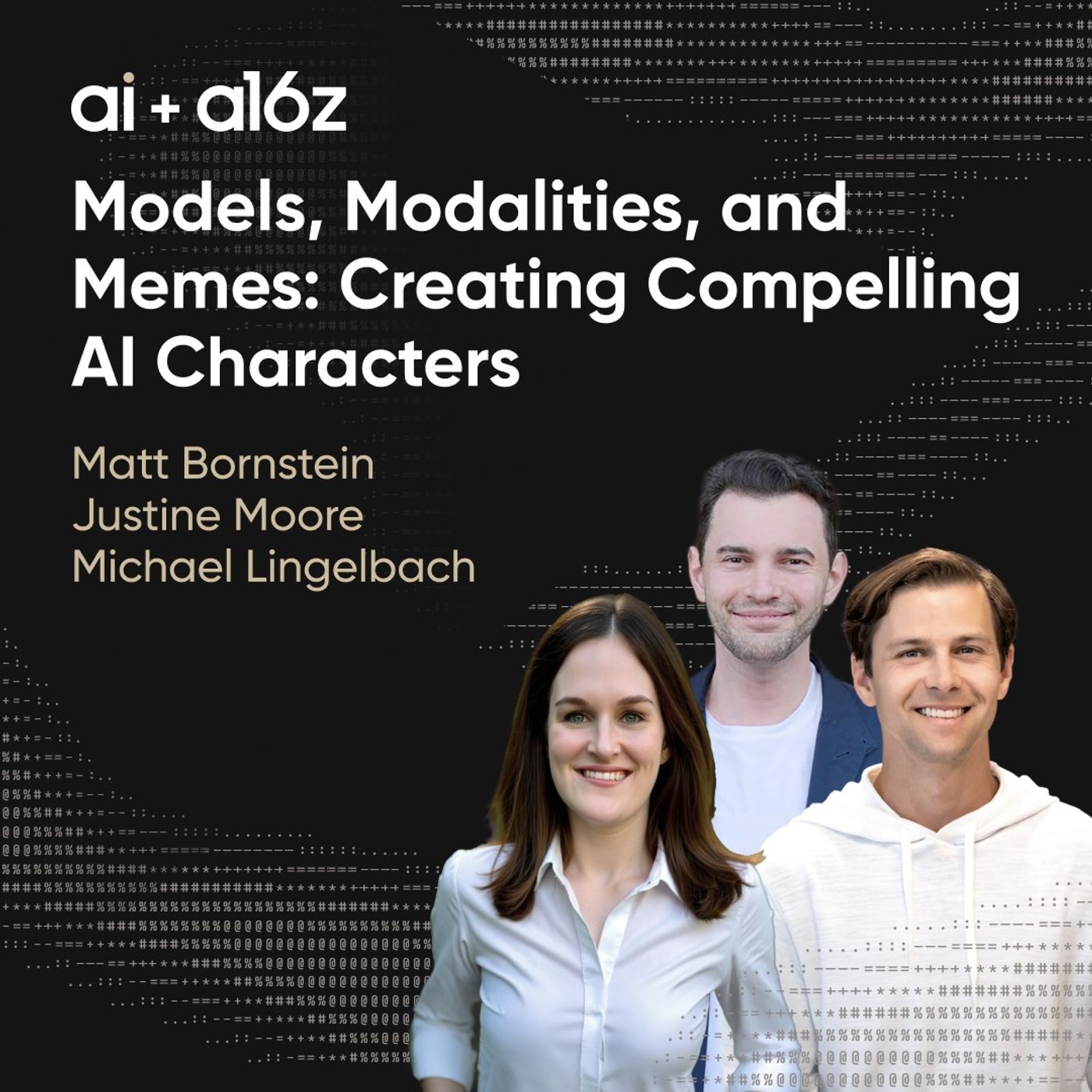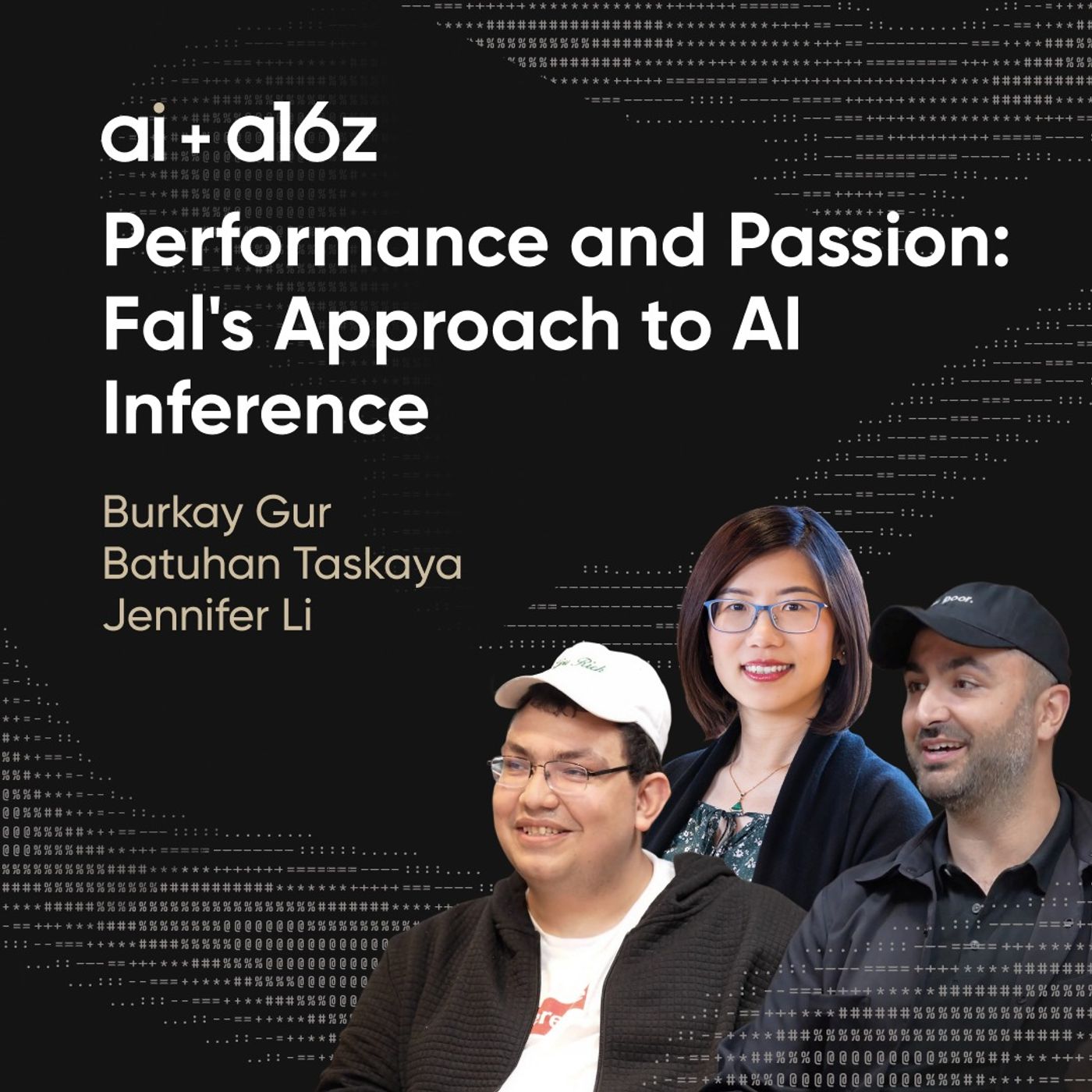Discover AI + a16z
AI + a16z

AI + a16z
Author: a16z
Subscribed: 344Played: 3,235Subscribe
Share
Description
Artificial intelligence is changing everything from art to enterprise IT, and a16z is watching all of it with a close eye. This podcast features discussions with leading AI engineers, founders, and experts, as well as our general partners, about where the technology and industry are heading.
73 Episodes
Reverse
What if the next leap in artificial intelligence isn’t about better language—but better understanding of space?In this episode, a16z General Partner Erik Torenberg moderates a conversation with Fei-Fei Li, cofounder and CEO of World Labs, and a16z General Partner Martin Casado, an early investor in the company. Together, they dive into the concept of world models—AI systems that can understand and reason about the 3D, physical world, not just generate text.Often called the “godmother of AI,” Fei-Fei explains why spatial intelligence is a fundamental and still-missing piece of today’s AI—and why she’s building an entire company to solve it. Martin shares how he and Fei-Fei aligned on this vision long before it became fashionable, and why it could reshape the future of robotics, creativity, and computational interfaces.From the limits of LLMs to the promise of embodied intelligence, this conversation blends personal stories with deep technical insights—exploring what it really means to build AI that understands the real (and virtual) world. Follow Fei-Fei Li:https://x.com/drfeifei Follow Martin Casado:https://x.com/martin_casado Stay Updated: If you enjoyed this episode, be sure to like, subscribe, and share with your friends!Find a16z on X: https://x.com/a16zFind a16z on LinkedIn: https://www.linkedin.com/company/a16zListen to the a16z Podcast on Spotify: https://open.spotify.com/show/5bC65RDvs3oxnLyqqvkUYXListen to the a16z Podcast on Apple Podcasts: https://podcasts.apple.com/us/podcast/a16z-podcast/id842818711Follow our host: https://x.com/eriktorenberg
Check out everything a16z is doing with artificial intelligence here, including articles, projects, and more podcasts. Please note that the content here is for informational purposes only; should NOT be taken as legal, business, tax, or investment advice or be used to evaluate any investment or security; and is not directed at any investors or potential investors in any a16z fund. a16z and its affiliates may maintain investments in the companies discussed. For more details please see a16z.com/disclosures. Hosted by Simplecast, an AdsWizz company. See pcm.adswizz.com for information about our collection and use of personal data for advertising.
a16z's Martin Casado sits down with Shikhar Shrestha, CEO and cofounder of Ambient, the company bringing agentic AI to physical security.Shikhar shares how a traumatic armed robbery at age 12—and a security camera that no one was watching—sparked his mission to make every camera intelligent.They discuss how Ambient's AI monitors camera feeds in real-time to detect threats and prevent incidents before they happen, navigating COVID as a physical security company, building their own reasoning VLM called Pulsar, and why the future of security is AI not just detecting threats but automatically responding to them.If you enjoyed this episode, please be sure to like, subscribe, and share with your friends.Follow Shikhar on X: https://x.com/shikharshresthaFollow Martin on X: x.com/martin_casado
Check out everything a16z is doing with artificial intelligence here, including articles, projects, and more podcasts. Please note that the content here is for informational purposes only; should NOT be taken as legal, business, tax, or investment advice or be used to evaluate any investment or security; and is not directed at any investors or potential investors in any a16z fund. a16z and its affiliates may maintain investments in the companies discussed. For more details please see a16z.com/disclosures. Hosted by Simplecast, an AdsWizz company. See pcm.adswizz.com for information about our collection and use of personal data for advertising.
Matt Knight spent five years as OpenAI’s CISO. Now he runs what colleagues call “the most interesting job at the company”: leading Aardvark, an AI agent that finds security vulnerabilities the way a human researcher would—by reading code, writing tests, and proposing patches. It recently found a memory corruption bug in OpenSSH, one of the most heavily audited codebases in existence.In this conversation with a16z’s Joel de la Garza, Matt traces the evolution from GPT-3 (which couldn’t analyze security logs at all) to GPT-4 (which could parse Russian cybercriminal chat logs written in slang) to today’s models that discover bugs humans have missed for decades. They also discussed the XZ Utils backdoor that nearly compromised half the internet and why 3.5 million unfilled security jobs might finally get some relief, and how Aardvark could give open source maintainers a fighting chance against nation-state attackers.If you enjoyed this episode, please be sure to like, subscribe, and share with your friends.Follow Matt Knight on X: https://x.com/embeddedsecFollow Joel de la Garza on LinkedIn: https://www.linkedin.com/in/3448827723723234/
Check out everything a16z is doing with artificial intelligence here, including articles, projects, and more podcasts. Please note that the content here is for informational purposes only; should NOT be taken as legal, business, tax, or investment advice or be used to evaluate any investment or security; and is not directed at any investors or potential investors in any a16z fund. a16z and its affiliates may maintain investments in the companies discussed. For more details please see a16z.com/disclosures. Hosted by Simplecast, an AdsWizz company. See pcm.adswizz.com for information about our collection and use of personal data for advertising.
Most companies still rely on dashboards to understand their data, even though AI now offers new ways to ask questions and explore information. Barry McCardel, CEO of Hex and former engineer at Palantir, joins a16z General Partner Sarah Wang to discuss how agent workflows, conversational interfaces, and context-aware models are reshaping analysis. Barry also explains how Hex aims to make everyone a data person by unifying analysis and AI in one workflow, and he reflects on his post about getting rid of their AI product team and the process behind Hex’s funny launch videos.Timecodes: 0:00 – The problem with dashboards1:20 – The evolution of data teams and AI’s role2:05 – Democratizing data: challenges and opportunities3:45 – The rise of agentive workflows9:48 – Threads and the changing UI of data analysis13:16 – Building AI agents: lessons from the notebook agent16:12 – Model capabilities and the future of AI in data19:10 – The importance of context and trust in data analysis24:34 – Semantic models and context engineering29:27 – Data team roles in the age of AI31:52 – Accuracy, trust, and evaluating AI systems37:43 – Building Hex: embracing AI as core, not an add-on48:48 – Pricing, value capture, and the future of SaaS55:55 – The modern data stack and industry consolidation1:04:26 – Acquisitions and owning the data insight layer1:06:46 – Lessons from Palantir: forward-deployed engineering1:13:11 – Commitment engineering and customer collaboration1:17:25 – Brand, launch videos, and having fun in SaaSResources:Follow Barry McCardel on X: https://x.com/barraldFollow Sarah Wang on X: https://x.com/sarahdingwang Stay Updated:If you enjoyed this episode, be sure to like, subscribe, and share with your friends!Find a16z on X: https://x.com/a16zFind a16z on LinkedIn:https://www.linkedin.com/company/a16zListen to the a16z Podcast on Spotify: https://open.spotify.com/show/5bC65RDvs3oxnLyqqvkUYXListen to the a16z Podcast on Apple Podcasts: https://podcasts.apple.com/us/podcast/a16z-podcast/id842818711Follow our host: https://x.com/eriktorenbergPlease note that the content here is for informational purposes only; should NOT be taken as legal, business, tax, or investment advice or be used to evaluate any investment or security; and is not directed at any investors or potential investors in any a16z fund. a16z and its affiliates may maintain investments in the companies discussed. For more details, please see http://a16z.com/disclosures.
Check out everything a16z is doing with artificial intelligence here, including articles, projects, and more podcasts. Please note that the content here is for informational purposes only; should NOT be taken as legal, business, tax, or investment advice or be used to evaluate any investment or security; and is not directed at any investors or potential investors in any a16z fund. a16z and its affiliates may maintain investments in the companies discussed. For more details please see a16z.com/disclosures. Hosted by Simplecast, an AdsWizz company. See pcm.adswizz.com for information about our collection and use of personal data for advertising.
Ian Webster built PromptFoo after watching 200 million Discord users systematically dismantle his AI agent—now Fortune 10 companies pay him to break theirs before customers do. The "lethal trifecta" sounds academic until you realize it's already happening: untrusted input plus sensitive data plus an exfiltration channel equals the security incident that just cost a SaaS company its multi-tenancy guarantees. Webster's red-teaming agents don't use signatures—they have 30,000 conversations with your system, socially engineering their way past guardrails the same way a teenager with emojis convinced ChatGPT to leak data, except his tools find the vulnerability before your users become the pen testers.Follow Ian Webster on X: https://x.com/iwebstFollow Joel on LinkedIn: https://www.linkedin.com/in/3448827723723234/
Check out everything a16z is doing with artificial intelligence here, including articles, projects, and more podcasts. Please note that the content here is for informational purposes only; should NOT be taken as legal, business, tax, or investment advice or be used to evaluate any investment or security; and is not directed at any investors or potential investors in any a16z fund. a16z and its affiliates may maintain investments in the companies discussed. For more details please see a16z.com/disclosures. Hosted by Simplecast, an AdsWizz company. See pcm.adswizz.com for information about our collection and use of personal data for advertising.
Netlify's CEO, Matt Biilmann, reveals a seismic shift nobody saw coming: 16,000 daily signups—five times last year's rate—and 96% aren't coming from AI coding tools. They're everyday people accidentally building React apps through ChatGPT, then discovering they need somewhere to deploy them. The addressable market for developer tools just exploded from 17 million JavaScript developers to 3 billion spreadsheet users, but only if your product speaks fluent AI—which is why Netlify's founder now submits pull requests he built entirely through prompting, never touching code himself, and why 25% of users immediately copy error messages to LLMs instead of debugging manually. The web isn't dying to agents; it's being reborn by them, with CEOs coding again and non-developers shipping production apps while the entire economics of software—from perpetual licenses to subscriptions to pure usage—gets rewritten in real-time.Follow Matt Biilmann on X: https://x.com/biilmannFollow Martin Casado on X: https://x.com/martin_casadoFollow Erik Torenberg on X: https://x.com/eriktorenberg
Check out everything a16z is doing with artificial intelligence here, including articles, projects, and more podcasts. Please note that the content here is for informational purposes only; should NOT be taken as legal, business, tax, or investment advice or be used to evaluate any investment or security; and is not directed at any investors or potential investors in any a16z fund. a16z and its affiliates may maintain investments in the companies discussed. For more details please see a16z.com/disclosures. Hosted by Simplecast, an AdsWizz company. See pcm.adswizz.com for information about our collection and use of personal data for advertising.
Sourcegraph's CTO just revealed why 90% of his code now comes from agents—and why the Chinese models powering America's AI future should terrify Washington. While Silicon Valley obsesses over AGI apocalypse scenarios, Beyang Liu's team discovered something darker: every competitive open-source coding model they tested traces back to Chinese labs, and US companies have gone silent after releasing Llama 3. The regulatory fear that killed American open-source development isn't hypothetical anymore—it's already handed the infrastructure layer of the AI revolution to Beijing, one fine-tuned model at a time. Resources:Follow Beyang Liu on X: https://x.com/beyangFollow Martin Casado on X: https://x.com/martin_casadoFollow Guido Appenzeller on X: https://x.com/appenz Stay Updated:If you enjoyed this episode, be sure to like, subscribe, and share with your friends!Find a16z on X: https://x.com/a16zFind a16z on LinkedIn: https://www.linkedin.com/company/a16zListen to the a16z Podcast on Spotify: https://open.spotify.com/show/5bC65RDvs3oxnLyqqvkUYXListen to the a16z Podcast on Apple Podcasts: https://podcasts.apple.com/us/podcast/a16z-podcast/id842818711Follow our host: https://x.com/eriktorenbergPlease note that the content here is for informational purposes only; should NOT be taken as legal, business, tax, or investment advice or be used to evaluate any investment or security; and is not directed at any investors or potential investors in any a16z fund. a16z and its affiliates may maintain investments in the companies discussed. For more details please see http://a16z.com/disclosures.
Check out everything a16z is doing with artificial intelligence here, including articles, projects, and more podcasts. Please note that the content here is for informational purposes only; should NOT be taken as legal, business, tax, or investment advice or be used to evaluate any investment or security; and is not directed at any investors or potential investors in any a16z fund. a16z and its affiliates may maintain investments in the companies discussed. For more details please see a16z.com/disclosures. Hosted by Simplecast, an AdsWizz company. See pcm.adswizz.com for information about our collection and use of personal data for advertising.
Ryo Lu spent years watching his designs die in meetings. Then he discovered the tool that lets designers ship code at the speed of thought: Cursor, the company where Ryo is now Head of Design. In this episode, we discuss why "taste" is the wrong framework for understanding the future, why purposeful apps are "selfish," how System 7 holds secrets about AI interfaces, and the radical bet that one codebase can serve everyone if you design the concepts right instead of the buttons.Follow Ryo Lu on X: https://x.com/ryolu_Check Out Ryo’s Website: https://os.ryo.lu/Follow Jennifer Li on X: https://x.com/JenniferHliFollow Erik Torenberg on X: https://x.com/eriktorenberg
Check out everything a16z is doing with artificial intelligence here, including articles, projects, and more podcasts. Please note that the content here is for informational purposes only; should NOT be taken as legal, business, tax, or investment advice or be used to evaluate any investment or security; and is not directed at any investors or potential investors in any a16z fund. a16z and its affiliates may maintain investments in the companies discussed. For more details please see a16z.com/disclosures. Hosted by Simplecast, an AdsWizz company. See pcm.adswizz.com for information about our collection and use of personal data for advertising.
The Stanford PhD who built DSPy thought he was just creating better prompts—until he realized he'd accidentally invented a new paradigm that makes LLMs actually programmable. While everyone obsesses over whether LLMs will get us to AGI, Omar Khattab is solving a more urgent problem: the gap between what you want AI to do and your ability to tell it, the absence of a real programming language for intent. He argues the entire field has been approaching this backwards, treating natural language prompts as the interface when we actually need something between imperative code and pure English, and the implications could determine whether AI systems remain unpredictable black boxes or become the reliable infrastructure layer everyone's betting on.Follow Omar Khattab on X: https://x.com/lateinteractionFollow Martin Casado on X: https://x.com/martin_casado
Check out everything a16z is doing with artificial intelligence here, including articles, projects, and more podcasts. Please note that the content here is for informational purposes only; should NOT be taken as legal, business, tax, or investment advice or be used to evaluate any investment or security; and is not directed at any investors or potential investors in any a16z fund. a16z and its affiliates may maintain investments in the companies discussed. For more details please see a16z.com/disclosures. Hosted by Simplecast, an AdsWizz company. See pcm.adswizz.com for information about our collection and use of personal data for advertising.
If you can’t robustly protect your secrets, you can’t have reliable AI agents.In this episode, Truffle Security cofounder and CEO Dylan Ayrey joins a16z partner Joel de la Garza to discuss the emergent security stack for AI agents, why leaks are actually getting worse, and how Truffle evolved from an open-source side project to a major VC-backed startup. Follow Dylan here: https://x.com/InsecureNatureFollow Joel here: https://www.linkedin.com/in/3448827723723234/
Check out everything a16z is doing with artificial intelligence here, including articles, projects, and more podcasts. Please note that the content here is for informational purposes only; should NOT be taken as legal, business, tax, or investment advice or be used to evaluate any investment or security; and is not directed at any investors or potential investors in any a16z fund. a16z and its affiliates may maintain investments in the companies discussed. For more details please see a16z.com/disclosures. Hosted by Simplecast, an AdsWizz company. See pcm.adswizz.com for information about our collection and use of personal data for advertising.
In this episode, a16z General Partner Martin Casado sits down with Ovais Tariq, Cofounder and CEO of Tigris Data, to discuss why independent storage is so hard, what operating your own datacenters is like, and what’s in store for the future of cloud.ResourcesFollow Ovais on X: https://x.com/ovaistariqFollow Tigris Data on X: https://x.com/tigrisdataFollow Martin on X: https://x.com/martin_casado
Check out everything a16z is doing with artificial intelligence here, including articles, projects, and more podcasts. Please note that the content here is for informational purposes only; should NOT be taken as legal, business, tax, or investment advice or be used to evaluate any investment or security; and is not directed at any investors or potential investors in any a16z fund. a16z and its affiliates may maintain investments in the companies discussed. For more details please see a16z.com/disclosures. Hosted by Simplecast, an AdsWizz company. See pcm.adswizz.com for information about our collection and use of personal data for advertising.
Customer support platforms lacked adequate solutions for B2B companies - until Pylon entered the scene.We sat down with Pylon cofounders Marty Kausas, Advith Chelikani, and Robert Eng to discuss why they went into B2B, how they plan to beat huge competitors, and why they still live together in a windowless apartment and work 9-9-6 hours despite having raised tens of millions.Follow Pylon on X: https://x.com/usepylonFollow Marty on X: https://x.com/marty_kausasFollow Advith on X: https://x.com/advith_cFollow Robert on X: https://x.com/rengrenghelloFollow Jennifer on X: https://x.com/JenniferHli
Check out everything a16z is doing with artificial intelligence here, including articles, projects, and more podcasts. Please note that the content here is for informational purposes only; should NOT be taken as legal, business, tax, or investment advice or be used to evaluate any investment or security; and is not directed at any investors or potential investors in any a16z fund. a16z and its affiliates may maintain investments in the companies discussed. For more details please see a16z.com/disclosures. Hosted by Simplecast, an AdsWizz company. See pcm.adswizz.com for information about our collection and use of personal data for advertising.
In 2025, we saw the first glimpses of true AI agents. In 2026, every company will be rushing to get them into production, and they’ll need companies like Keycard to manage fleets of agents.In this conversation, a16z Partner Joel de la Garza sits down with Keycard Cofounder and CEO Ian Livingstone to discuss the continuum from copilots to agents, the security realities of tool-calling, why enterprises will adopt before consumers, and how to control your agents. Follow Joel on LinkedIn: https://www.linkedin.com/in/3448827723723234/Follow Ian on X: https://x.com/ianlivingstoneFollow Keycard on X: https://x.com/keycardlabsLearn more about Keycard: https://www.keycard.sh/
Check out everything a16z is doing with artificial intelligence here, including articles, projects, and more podcasts. Please note that the content here is for informational purposes only; should NOT be taken as legal, business, tax, or investment advice or be used to evaluate any investment or security; and is not directed at any investors or potential investors in any a16z fund. a16z and its affiliates may maintain investments in the companies discussed. For more details please see a16z.com/disclosures. Hosted by Simplecast, an AdsWizz company. See pcm.adswizz.com for information about our collection and use of personal data for advertising.
AI coding has emerged as a major market for AI: one that’s already rewriting how software gets built.a16z Infra Partners Yoko Li and Guido Appenzeller break down how “agents with environments” are changing the dev loop; why repos and PRs may need new abstractions; and where ROI is showing up first (like legacy code migration). We also cover token economics for engineering teams, the emerging agent toolbox (sandboxes, code search/parsing, agent-optimized docs, orchestration), and founder opportunities when you treat agents as users, not just tools.Read the blog post here.Find Yoko here: https://x.com/stuffyokodrawsFind Guido here: https://x.com/appenz
Check out everything a16z is doing with artificial intelligence here, including articles, projects, and more podcasts. Please note that the content here is for informational purposes only; should NOT be taken as legal, business, tax, or investment advice or be used to evaluate any investment or security; and is not directed at any investors or potential investors in any a16z fund. a16z and its affiliates may maintain investments in the companies discussed. For more details please see a16z.com/disclosures. Hosted by Simplecast, an AdsWizz company. See pcm.adswizz.com for information about our collection and use of personal data for advertising.
What if the hardest part of building a company isn’t the product, but knowing exactly who it’s for?In this episode, a16z General Partner Martin Casado sits down with Abhishek Agrawal, Cofounder and CEO of Material Security, to discuss how an ideal customer profile is discovered, how to manage any kind of customer, and how frothy markets can distort real signal.Follow Martin on X: https://x.com/martin_casadoFollow Material Security on X: https://x.com/material_secFollow Abhishek on LinkedIn: https://www.linkedin.com/in/abhishek--agrawal/
Check out everything a16z is doing with artificial intelligence here, including articles, projects, and more podcasts. Please note that the content here is for informational purposes only; should NOT be taken as legal, business, tax, or investment advice or be used to evaluate any investment or security; and is not directed at any investors or potential investors in any a16z fund. a16z and its affiliates may maintain investments in the companies discussed. For more details please see a16z.com/disclosures. Hosted by Simplecast, an AdsWizz company. See pcm.adswizz.com for information about our collection and use of personal data for advertising.
AI is transforming both sides of the cybersecurity cat-and-mouse game. Attackers are using LLMs to scale impersonation, phishing, and even deepfake fraud—while defenders are racing to automate detection and takedowns at the same speed.In this episode, a16z partner Joel de la Garza talks with Kevin Tian, cofounder & CEO of Doppel Security (and former Uber engineer), about building in this new landscape. They cover:Why outsider founders sometimes build the most effective security companiesThe “3 V’s” framework for today’s social engineering attacks: volume, velocity, varietyHow Doppel uses reasoning models and reinforcement fine-tuning to cut false positives and improve precisionSimulation tools like “vibe phishing” to train employees on real attacker tacticsThe shift from manual cyber-intelligence services to AI-driven, software-margin businessesWhy the biggest bottleneck now isn’t model cost—but engineering time to deliver the right contextIf you’re building security products or exploring how AI can automate tough edge cases, this is a ground-level look at what’s working—and what comes next.
Check out everything a16z is doing with artificial intelligence here, including articles, projects, and more podcasts. Please note that the content here is for informational purposes only; should NOT be taken as legal, business, tax, or investment advice or be used to evaluate any investment or security; and is not directed at any investors or potential investors in any a16z fund. a16z and its affiliates may maintain investments in the companies discussed. For more details please see a16z.com/disclosures. Hosted by Simplecast, an AdsWizz company. See pcm.adswizz.com for information about our collection and use of personal data for advertising.
What if you could retake your favorite memories years after they happened, fixing the lighting, catching the smile, or even opening your eyes?In this conversation, a16z General Partner Martin Casado and Partner Yoko Li sit down with scientist and Lytro founder Ren Ng along with Phota Labs cofounders Cecilia Zhang and Zhihao “Zach” Xia to explore the past, present, and future of computational photography. They trace the story from the invention of light-field cameras and the evolution of smartphone photography to today’s AI powered retakes that preserve identity and context in ways filters never could. Together they reflect on how AI is changing what it means to capture a moment, why authenticity matters as much as aesthetics, and how the future of photography may no longer depend on a lens at all but on models that know you.Resources: Find Cecilia on GitHub: https://ceciliavision.github.io/Find Zach on GitHub: https://likesum.github.io/Find Ren on LinkedIn: https://www.linkedin.com/in/renngFind Yoko on X: https://x.com/stuffyokodrawsFind Martin on X: https://x.com/martin_casado Timecodes:00:00 The Decisive Moment in Photography00:33 Introduction to Computational Photography01:05 Personal Histories and Connections02:27 Evolution of Computational Photography04:15 The Birth of Light Field Photography07:28 From Hardware to Software Innovations08:52 Founding of Photo Labs11:10 Generative AI in Photography13:54 The Future of Photography14:47 Personalized Visual Gen AI16:27 User Reactions and Real-World Applications17:44 Technical Innovations and Challenges24:11 New Use Cases and Exciting Prospects25:34 The Essence of Slide Photography26:16 The Future of Photography: Generative AI28:58 Authenticity in Photography32:11 Generative AI and User Behavior34:39 The Impact of Generative AI on Photography37:02 The Evolution of Photography Styles46:20 The Future of Computational Photography
Check out everything a16z is doing with artificial intelligence here, including articles, projects, and more podcasts. Please note that the content here is for informational purposes only; should NOT be taken as legal, business, tax, or investment advice or be used to evaluate any investment or security; and is not directed at any investors or potential investors in any a16z fund. a16z and its affiliates may maintain investments in the companies discussed. For more details please see a16z.com/disclosures. Hosted by Simplecast, an AdsWizz company. See pcm.adswizz.com for information about our collection and use of personal data for advertising.
OpenAI’s Codex has already shipped hundreds of thousands of pull requests in its first month. But what is it really, and how will coding agents change the future of software?In this episode, General Partner Anjney Midha goes behind the scenes with one of Codex’s product leads- Alexander Embiricos - to unpack its origin story, why its PR success rate is so high, the safety challenges of autonomous agents, and what this all means for developers, students, and the future of coding.Resources: Find Alex on X: https://x.com/embiricoFind Anjney on X: https://twitter.com/AnjneyMidha Stay Updated: Find a16z on Twitter: https://twitter.com/a16zFind a16z on LinkedIn: https://www.linkedin.com/company/a16zSubscribe on your favorite podcast app: https://a16z.simplecast.com/Follow our host: https://x.com/eriktorenbergPlease note that the content here is for informational purposes only; should NOT be taken as legal, business, tax, or investment advice or be used to evaluate any investment or security; and is not directed at any investors or potential investors in any a16z fund. a16z and its affiliates may maintain
Check out everything a16z is doing with artificial intelligence here, including articles, projects, and more podcasts. Please note that the content here is for informational purposes only; should NOT be taken as legal, business, tax, or investment advice or be used to evaluate any investment or security; and is not directed at any investors or potential investors in any a16z fund. a16z and its affiliates may maintain investments in the companies discussed. For more details please see a16z.com/disclosures. Hosted by Simplecast, an AdsWizz company. See pcm.adswizz.com for information about our collection and use of personal data for advertising.
Models, Modalities, and Memes: Creating Compelling AI CharactersIn this episode of AI + a16z, Hedra founder and CEO Michael Lingelbach joins a16z partners Justine Moore and Matt Bornstein to talk about building AI-native video — and why the next wave of generative content is all about characters, not just clips.They discuss how Hedra’s expressive, full-body, dialogue-centric video models are powering everything from viral meme content to enterprise training tools. Michael explains why “character” is the core design primitive in Hedra’s architecture, how consumers are leading the charge in discovering new use cases, and what it takes to productionize those behaviors for real-world applications.Along the way, they explore what makes multi-modal generation uniquely hard, the role of user control in shaping believable AI performances, and why being a founder sometimes means responding to thousands of support emails — at 6 a.m.Key takeaways:How Hedra’s real-time video model blends audio, image, and character controlWhy generative content is shifting from static avatars to programmable personasThe surprising crossover between consumer creativity and enterprise adoptionWhere existing LLMs fall short in generating emotionally authentic charactersWhat vibe coding, hands-on design, and founder obsession look like in practiceFor anyone curious about building AI characters, scaling creative workflows, or the future of human-computer interaction — this one’s not to be missed.
Check out everything a16z is doing with artificial intelligence here, including articles, projects, and more podcasts. Please note that the content here is for informational purposes only; should NOT be taken as legal, business, tax, or investment advice or be used to evaluate any investment or security; and is not directed at any investors or potential investors in any a16z fund. a16z and its affiliates may maintain investments in the companies discussed. For more details please see a16z.com/disclosures. Hosted by Simplecast, an AdsWizz company. See pcm.adswizz.com for information about our collection and use of personal data for advertising.
If you've been experimenting with image, video, and audio models, the chances are you've been both blown away by how good they're becoming, and also a little perturbed by how long they can take to generate. If you've been using a platform like Fal, however, your experience on the latter point might be more positive.In this episode, Fal cofounder and CEO Burkay Gur and head of engineering Batuhan Taskaya join a16z general partner Jennifer Li to discuss how they built an inference platform — or, as they call it, a generative media cloud — that's optimized for speed, performance, and user experience. These are core features for a great product, yes, and also ones borne of necessity as the early team obsessively engineered around its meager GPU capacity at the height of the AI infrastructure crunch.But this is more than a story about infrastructure. As you'll hear, they also delve into sales and hiring strategy; the team's overall excitement over these emerging modalities; and the trends they're seeing as competition in the world of video models, especially, heats up.
Check out everything a16z is doing with artificial intelligence here, including articles, projects, and more podcasts. Please note that the content here is for informational purposes only; should NOT be taken as legal, business, tax, or investment advice or be used to evaluate any investment or security; and is not directed at any investors or potential investors in any a16z fund. a16z and its affiliates may maintain investments in the companies discussed. For more details please see a16z.com/disclosures. Hosted by Simplecast, an AdsWizz company. See pcm.adswizz.com for information about our collection and use of personal data for advertising.


